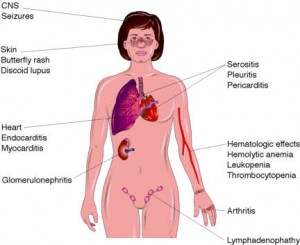Sasha McHale, Daughter of Rocket’s Coach, Dies from Lupus Complications

Alexandra (“Sasha”) McHale, daughter of Houston Rockets coach Kevin McHale has died at the age of 23. It is reported that she died of complications from the autoimmune disease systemic lupus erythematosis (“lupus” or SLE for short).
Sasha had been battling the disease for a number of years, but it did not stop her from the sport she and her father both loved. Like her father, she played forward on her high school and college football teams. She even wore the number 32, the same one her father wore during his Hall of Fame career with the Boston Celtics.
Her disease apparently became more severe in 2011, while studying abroad in Australia. It was reported that the disease affected her skin and joints, her lungs and her nervous system. Besides the standard medical treatment of corticosteroids and cytotoxic drugs, Sasha also altered her diet to remove foods that could increase inflammation.
Her father took a leave of absence from the Rockets on November 10th to be with his daughter during her hospitalization. She died on Saturday. A statement released by the Houston Rockets stated:
Kevin and Lynn are loving and dedicated parents who will need our continued support throughout this very difficult time,” she wrote. “Our entire organization is mourning the McHale family’s loss and we ask that you keep them in your thoughts and prayers.
What is lupus?
SLE is an autoimmune disease in which the body attacks itself because the immune system fails to recognize the difference between the body’s own cells and tissues and”foreign” substances such as the bacteria and viruses that our immune systems normally protect us against.
Anyone can get Lupus, but it is most common among girls and women. More than 90% of people with lupus are female.
In the US, lupus is more likely to occur among people who are of African-American, Hispanic-Latino, and Native American descent. According to the Lupus Foundation of America, between 1.5 and 2 million Americans have some form of lupus, including some 5-10 thousand children.
What are the symptoms?
Lupus is often difficult to diagnose. It’s often mistaken for other diseases and has been called the “great imitator.” The signs of lupus differ from person to person. Some people have just a few signs; others have more.
- Red rash or color change on the face, often in the shape of a butterfly across the nose and cheeks
- Painful or swollen joints
- Unexplained fever
- Chest pain with deep breathing
- Swollen glands
- Extreme fatigue (feeling tired all the time)
- Unusual hair loss (mainly on the scalp)
- Pale or purple fingers or toes from cold or stress
- Sensitivity to the sun
- Low blood count
- Depression, trouble thinking, and/or memory problems.
What are the complications of lupus?
Some people with SLE have abnormal deposits in the kidney cells. This leads to a condition called lupus nephritis. Patients with this condition may eventually develop kidney failure and need dialysis or a kidney transplant.
SLE causes damage to many different parts of the body, including:
- Blood clots in the legs (deep vein thrombosis) or lungs (pulmonary embolism)
- Destruction of red blood cells (hemolytic anemia) or anemia of chronic disease
- Fluid around the heart (pericarditis), endocarditis, or inflammation of the heart (myocarditis)
- Fluid around the lungs (pleural effusions) and damage to lung tissue
- Pregnancy complications, including miscarriage
- Stroke
- Severely low blood platelets (thrombocytopenia)
- Inflammation of the blood vessels
For more information, go to the Resounding Health Casebook on Lupus.




























2 Comments